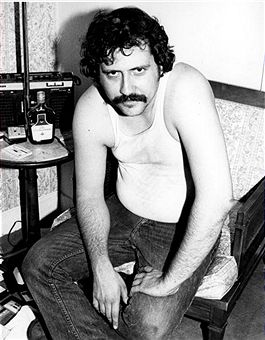
Lester Bangs
Leslie Conway "Lester" Bangs (December 14, 1948 – April 30, 1982)[1] was an American music journalist. He wrote for Creem and Rolling Stone magazines, and was a leading influence in rock music criticism.[2][3] The music critic Jim DeRogatis called him "America's greatest rock critic".[4]
This article is about the American music journalist. For the British/German music journalist, see Alan Bangs.
Lester Bangs
Early life[edit]
Bangs was born in Escondido, California. He was the son of Norma Belle (née Clifton) and Conway Leslie Bangs, a truck driver.[5]: 3–4 Both of his parents were from Texas: his father from Enloe and his mother from Pecos County.[6] Norma Belle was a devout Jehovah's Witness. Conway died in a fire when his son was young. When Bangs was 11, he moved with his mother to El Cajon, also in San Diego County.[7]
His early interests and influences ranged from the Beats (particularly William S. Burroughs) and jazz musicians John Coltrane and Miles Davis, to comic books and science fiction.[8] He had a connection with The San Diego Door, an underground newspaper of the late 1960s.
Career[edit]
Rolling Stone magazine[edit]
Bangs became a freelance writer in 1969, after reading an ad in Rolling Stone soliciting readers' reviews. His first accepted piece was a negative review of the MC5 album Kick Out the Jams, which he sent to Rolling Stone with a note requesting, if the magazine were to decline to publish the review, that he be given a reason for the decision; no reply was forthcoming, as the magazine did indeed publish the review.
His 1970 review of Black Sabbath's first album in Rolling Stone was scathing, rating them as imitators of the band Cream:
Death[edit]
Bangs died in New York City on April 30, 1982, at the age of 33; he was self-medicating a bad case of the flu and accidentally overdosed on dextropropoxyphene (an opioid analgesic), diazepam (a benzodiazepine), and NyQuil.[19][20]
At the time of his death, Bangs appeared to be listening to music. Earlier that day he had bought a copy of Dare by the English synth-pop band the Human League, according to Let It Blurt, Jim DeRogatis's biography of Bangs. Later that night, Bangs's friend found him unresponsive, lying on a couch in his apartment. "Dare was spinning on the turntable, and the needle was stuck on the end groove", DeRogatis wrote.[5]: 233
Music[edit]
Bangs was also a musician. In 1976, he and Peter Laughner recorded an acoustic improvisation in the Creem office. The recording included covers/parodies of songs like "Sister Ray" and "Pale Blue Eyes", both by the Velvet Underground.
In 1977, Bangs recorded, as a solo artist, a 7" vinyl single named "Let It Blurt/Live", mixed by John Cale and released in 1979.
In 1977, at the New York City nightclub CBGB, while Bangs was talking to guitarist Mickey Leigh, Joey Ramone's brother, the idea for a band named "Birdland" came to fruition. Although they both had their roots in jazz, the two wanted to create an old school rock & roll group. Leigh brought in his post-punk band, The Rattlers (David Merrill on bass; Matty Quick on drums), and cut "Birdland with Lester Bangs". The recording took place at the under renovation Electric Lady Studios. Bassist David Merrill, who was working on the construction of the studio, had the keys to the building and they snuck the band in on April Fool's Day 1979 for an impromptu and late night recording session. The result was a completely uncut and un-dubbed recording that displayed raw music. Birdland broke up within two months of the recording (in which the cassette tape from the session became the master, mixed by Ed Stasium and released by Leigh in 1986).
Reviewing the 1986 LP "Birdland" with Lester Bangs, Robert Christgau gave it a B-plus and said, "musically he always had the instincts, and words were no problem."[25]
In 1980 Bangs traveled to Austin, Texas, where he met a surf/punk rock group, The Delinquents. In early December of the same year, they recorded an album as "Lester Bangs and the Delinquents", titled Jook Savages on the Brazos, released the following year.
In 1990 the Mekons released the EP F.U.N. 90 with Bangs's declamation in the song "One Horse Town".